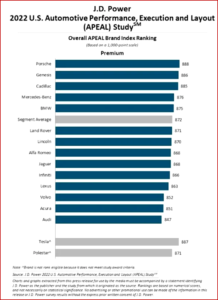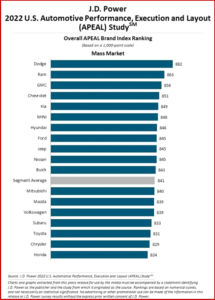Satisfaction with fuel economy and range is normally stronger among owners of gas-powered vehicles than satisfaction with range and charging speed among owners of battery-electric vehicles (BEVs). This year, BEV owners have a similar, albeit slightly lower, level of satisfaction with charge times and driving range as they did a year ago.
However, high gas prices have led to a noticeable decrease in fuel economy/range satisfaction among owners of gas-powered vehicles, according to the J.D. Power 2022 U.S. Automotive Performance, Execution and Layout (APEAL) Study,SM released today. The gap between economy/range is only 7 points on a 1,000-point scale.

Click to Enlarge.
The drop in satisfaction with economy/range also has contributed to a one-point decline in overall new-vehicle satisfaction, the first decline since 2014 and only the fifth year-over-year decline in the 27-year history of the study.
“The most important factor leading to the industry decline this year is owners’ perception of their vehicle’s fuel economy,” said David Amodeo, director of global automotive at J.D. Power. “The study was fielded as fuel prices were experiencing a meteoric rise, and that pinch at the pump is conveyed in lower vehicle satisfaction. Battery-electric vehicles have not been negatively affected by the increase in fuel costs but do have issues related to battery range and charging time.”
Now in its 27th year, the APEAL Study complements the J.D. Power U.S. Initial Quality Study (IQS)SM and the J.D. Power U.S. Tech Experience Index (TXI) StudySM by measuring owners’ emotional attachment and level of excitement with their new vehicle. The APEAL Study asks owners to consider 37 attributes, ranging from the sense of comfort they feel when climbing into the driver’s seat to the exhilaration they get when they step on the accelerator. Vehicle owners’ responses to queries about these attributes are aggregated to compute an overall APEAL Index score measured on a 1,000-point scale.
Key Findings
Mass market brands decrease in emotional appeal: The 19-point gap in score between premium and mass market brands in 2021 has widened to 31 points this year, as mass market brands decline 4 points and premium brands improve 8 points.

Click to Enlarge.
Repeats for top mass market and premium brands: Dodge is the highest-ranked mass market brand in APEAL for a third consecutive year with a score of 882, identical to its score a year ago. Porsche, a perennial top-performing premium brand in APEAL, ranks highest among all brands with a score of 888, a six-point improvement from 2021. “While these brands are very different, both Dodge and Porsche owners identify strongly with their vehicles,” Amodeo said. “That certainly contributes to their stellar APEAL Study results.”
Electrified vehicles are not as appealing as gas vehicles: Hybrid vehicles and plug-in hybrid vehicles (PHEVs) have lower composite APEAL Index scores than conventional gasoline-powered vehicles. The score for PHEVs is 835 and is 832 for hybrids. In comparison, the composite index score for gasoline-powered vehicles is 846. Battery-electric vehicles (excluding Tesla) also underperform gasoline vehicles in APEAL with an index score of 838. Tesla vehicles are summarized separately from the BEV composite score because the brand’s dominance in the category would skew the results of all other BEVs. It is important to understand that certain attributes of Tesla models continue to outperform other BEVs, though there are notable challengers emerging such as the Mercedes-Benz EQS.
Tesla Motors officially included for the first time: Tesla Motors is included in the industry calculation for the first time, with a score of 887. However, because Tesla Motors does not allow J.D. Power access to owner information in the states where that permission is required by law, Tesla models remain ineligible for awards.

About Ken Zino
Ken Zino, editor and publisher of AutoInformed, is a versatile auto industry participant with global experience spanning decades in print and broadcast journalism, as well as social media. He has automobile testing, marketing, public relations and communications experience. He is past president of The International Motor Press Assn, the Detroit Press Club, founding member and first President of the Automotive Press Assn. He is a member of APA, IMPA and the Midwest Automotive Press Assn.
He also brings an historical perspective while citing their contemporary relevance of the work of legendary auto writers such as Ken Purdy, Jim Dunne or Jerry Flint, or writers such as Red Smith, Mark Twain, Thomas Jefferson – all to bring perspective to a chaotic automotive universe.
Above all, decades after he first drove a car, Zino still revels in the sound of the exhaust as the throttle is blipped during a downshift and the driver’s rush that occurs when the entry, apex and exit points of a turn are smoothly and swiftly crossed. It’s the beginning of a perfect lap.
AutoInformed has an editorial philosophy that loves transportation machines of all kinds while promoting critical thinking about the future use of cars and trucks.
Zino builds AutoInformed from his background in automotive journalism starting at Hearst Publishing in New York City on Motor and MotorTech Magazines and car testing where he reviewed hundreds of vehicles in his decade-long stint as the Detroit Bureau Chief of Road & Track magazine. Zino has also worked in Europe, and Asia – now the largest automotive market in the world with China at its center.


J.D. Power: Gasoline Powered Vehicle Satisfaction Drops
Satisfaction with fuel economy and range is normally stronger among owners of gas-powered vehicles than satisfaction with range and charging speed among owners of battery-electric vehicles (BEVs). This year, BEV owners have a similar, albeit slightly lower, level of satisfaction with charge times and driving range as they did a year ago.
However, high gas prices have led to a noticeable decrease in fuel economy/range satisfaction among owners of gas-powered vehicles, according to the J.D. Power 2022 U.S. Automotive Performance, Execution and Layout (APEAL) Study,SM released today. The gap between economy/range is only 7 points on a 1,000-point scale.
Click to Enlarge.
The drop in satisfaction with economy/range also has contributed to a one-point decline in overall new-vehicle satisfaction, the first decline since 2014 and only the fifth year-over-year decline in the 27-year history of the study.
“The most important factor leading to the industry decline this year is owners’ perception of their vehicle’s fuel economy,” said David Amodeo, director of global automotive at J.D. Power. “The study was fielded as fuel prices were experiencing a meteoric rise, and that pinch at the pump is conveyed in lower vehicle satisfaction. Battery-electric vehicles have not been negatively affected by the increase in fuel costs but do have issues related to battery range and charging time.”
Now in its 27th year, the APEAL Study complements the J.D. Power U.S. Initial Quality Study (IQS)SM and the J.D. Power U.S. Tech Experience Index (TXI) StudySM by measuring owners’ emotional attachment and level of excitement with their new vehicle. The APEAL Study asks owners to consider 37 attributes, ranging from the sense of comfort they feel when climbing into the driver’s seat to the exhilaration they get when they step on the accelerator. Vehicle owners’ responses to queries about these attributes are aggregated to compute an overall APEAL Index score measured on a 1,000-point scale.
Key Findings
Mass market brands decrease in emotional appeal: The 19-point gap in score between premium and mass market brands in 2021 has widened to 31 points this year, as mass market brands decline 4 points and premium brands improve 8 points.
Click to Enlarge.
Repeats for top mass market and premium brands: Dodge is the highest-ranked mass market brand in APEAL for a third consecutive year with a score of 882, identical to its score a year ago. Porsche, a perennial top-performing premium brand in APEAL, ranks highest among all brands with a score of 888, a six-point improvement from 2021. “While these brands are very different, both Dodge and Porsche owners identify strongly with their vehicles,” Amodeo said. “That certainly contributes to their stellar APEAL Study results.”
Electrified vehicles are not as appealing as gas vehicles: Hybrid vehicles and plug-in hybrid vehicles (PHEVs) have lower composite APEAL Index scores than conventional gasoline-powered vehicles. The score for PHEVs is 835 and is 832 for hybrids. In comparison, the composite index score for gasoline-powered vehicles is 846. Battery-electric vehicles (excluding Tesla) also underperform gasoline vehicles in APEAL with an index score of 838. Tesla vehicles are summarized separately from the BEV composite score because the brand’s dominance in the category would skew the results of all other BEVs. It is important to understand that certain attributes of Tesla models continue to outperform other BEVs, though there are notable challengers emerging such as the Mercedes-Benz EQS.
Tesla Motors officially included for the first time: Tesla Motors is included in the industry calculation for the first time, with a score of 887. However, because Tesla Motors does not allow J.D. Power access to owner information in the states where that permission is required by law, Tesla models remain ineligible for awards.
About Ken Zino
Ken Zino, editor and publisher of AutoInformed, is a versatile auto industry participant with global experience spanning decades in print and broadcast journalism, as well as social media. He has automobile testing, marketing, public relations and communications experience. He is past president of The International Motor Press Assn, the Detroit Press Club, founding member and first President of the Automotive Press Assn. He is a member of APA, IMPA and the Midwest Automotive Press Assn. He also brings an historical perspective while citing their contemporary relevance of the work of legendary auto writers such as Ken Purdy, Jim Dunne or Jerry Flint, or writers such as Red Smith, Mark Twain, Thomas Jefferson – all to bring perspective to a chaotic automotive universe. Above all, decades after he first drove a car, Zino still revels in the sound of the exhaust as the throttle is blipped during a downshift and the driver’s rush that occurs when the entry, apex and exit points of a turn are smoothly and swiftly crossed. It’s the beginning of a perfect lap. AutoInformed has an editorial philosophy that loves transportation machines of all kinds while promoting critical thinking about the future use of cars and trucks. Zino builds AutoInformed from his background in automotive journalism starting at Hearst Publishing in New York City on Motor and MotorTech Magazines and car testing where he reviewed hundreds of vehicles in his decade-long stint as the Detroit Bureau Chief of Road & Track magazine. Zino has also worked in Europe, and Asia – now the largest automotive market in the world with China at its center.